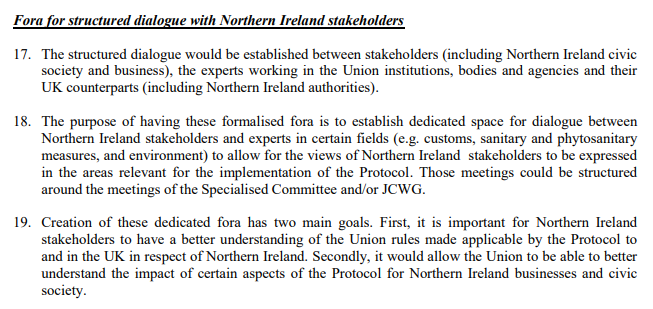
As promised, worth taking some time over a remarkable speech, one that demonstrates the UK government seeing the world quite differently to the common understanding of others. gov.uk/government/spe…
First, possibly uniquely in the world the UK has no interest in influencing its neighbour's choices, covering 50% of our trade. Even the US and China want to influence EU regulations, recognising their importance, but not the UK. 

I doubt there are too many trade specialists in the world who think customs practicalities are more important than trade regulations, though energy suppliers will certainly be important. But yes, lobbying Portugal will apparently be more important than the EU. Its a view. 

Moving on, we have the incredible proposition of England, after some of the longest lockdowns in Europe, being the free-est. And the brave prediction that our checks will be less than those of the EU, which is unlikely across the whole range of trade in goods and services. 

After describing EU member states as in effect undemocratic we then have a new definition of populism, as basically equalling democracy. This is less a new statement than a peculiar form of diplomacy to insult all of your neighbours. 

The next section consists of a long complaint about the EU accepting no fault whatsoever on the part of the UK. This doesn't sound like a country wanting to work constructively, rather like one that thinks it would all be better if things were just done its way. 

I think this is another remarkable statement, on the Northern Ireland protocol, to the extent of suggesting we broke it ("maybe there is a world in which the protocol could have worked, more sensitively implemented") and you have to fix it. 

This paragraph introduces another element to the speech, of patronising the audience. We understand this issue, and you do not. So do as we say. It of course ignores that there are experts on Northern Ireland in the EU. 

After discussing revised proposals for Northern Ireland, repeating a UK line of five and a half years, we move on to a view of Northern Ireland ignoring the seminal 1998 agreement, possibly outright offensively to at least two other countries. Interesting approach. 

Having insulted the presumably intended audience, finishing with a plea for unity is not I suspect going to land well with them, either in the EU or US. There might have been a speech which would, but unfortunately this wasn't it. And the view of trade, well [shudders]. /end 

• • •
Missing some Tweet in this thread? You can try to
force a refresh






